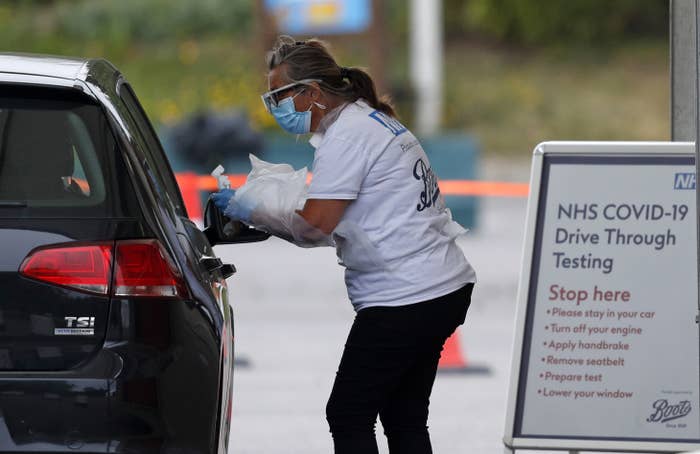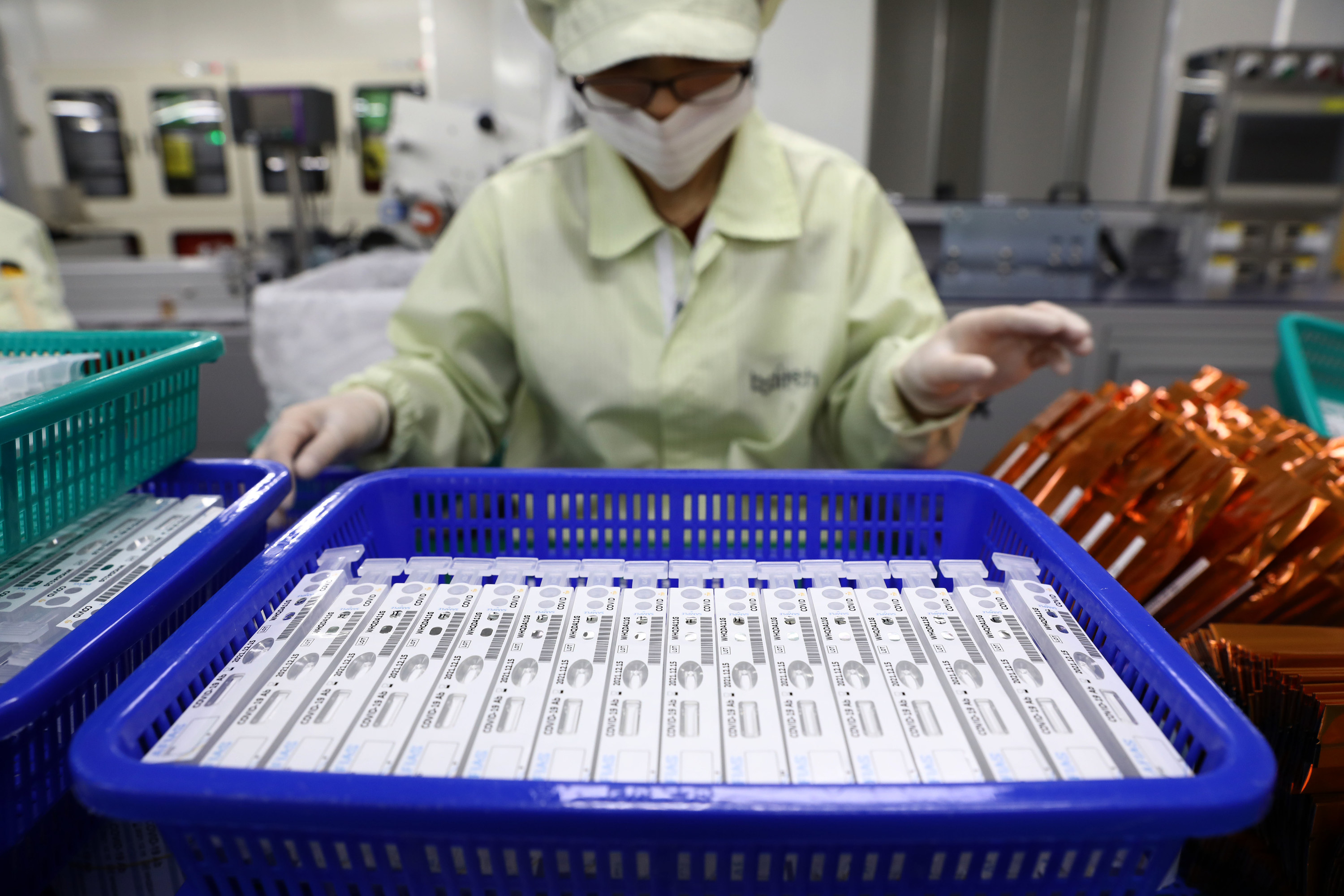
BuzzFeed News has reporters across five continents bringing you trustworthy stories about the impact of the coronavirus. To help keep this news free, become a member and sign up for our newsletter, Outbreak Today.
As Boris Johnson begins the process of gradually easing restrictions after two months of coronavirus lockdown, the ability of England’s public health authorities to quickly “test, track and trace” new cases will become central to controlling the virus and reducing the possibility of an even more damaging second wave.
But there’s another potentially fundamental problem with the strategy that’s been overlooked amid controversies over the number of daily tests being carried out and the NHS contact tracing app. That is, the length of time it’s taking for tests to be conducted, processed by labs, and the results returned to patients.
This lag in turnaround times matters because contact tracing relies on quickly alerting people who have been in contact with an infected person so that they can in turn self-isolate and halt the chain of transmission.
"Rapid turnaround is a critical part of any test, track and trace strategy as you are aiming to quarantine people who could shed the virus quickly," said Jeremy Hunt, the UK's former health secretary who now chairs the House of Commons health select committee.
BuzzFeed News has attempted to obtain this information, but the Department of Health and Social Care (DHSC) has repeatedly refused this week to reveal the current average turnaround time for tests.
While the government publishes an update every day on new positive cases in the previous 24 hours alongside the number of tests carried out in that period, it does not disclose when any of these new patients were tested.
DHSC says it aims to return test results within 48 hours of tests being taken at regional test sites, and within 72 hours for home tests. Despite being asked repeatedly by BuzzFeed News whether these targets were being currently met, the department refused to provide an answer. Nor would it say when, on average, new cases published as part of the daily data release had been tested.
One current figure emerged during the prime minister’s statement in Parliament on Monday, though not from the government front bench. Johnson was asked by Conservative MP Kevin Hollinrake whether the contact tracing system would be “more effective” if the time taken to process results could be reduced from “the current five days to as little as 24 hours”.
“Speed of turnaround is crucial in improving our testing,” the prime minister agreed. “We have done 100,000 tests again yesterday, I am pleased to say, but clearly pace of turnaround is absolutely critical for getting up to where we need to be — 200,000, as he knows, by the end of the month, and then a much more ambitious programme thereafter.”
Hollinrake, who represents Thirsk and Malton, told BuzzFeed News that the five-day figure he cited was the current turnaround in some settings, such as care homes, but in some cases it was taking even longer.
BuzzFeed News put the five-day claim to DHSC. Again, it declined to give an answer.
Public Health England (PHE), whose labs are responsible for NHS swab testing of those with a medical need and, where possible, the most critical key workers, says it takes 24–48 hours to process a test once a sample reaches a lab. But it takes time for the sample to be sent to the lab, and then more time for the result to be sent back to the person who took the test.
PHE said it could not comment on the total time from test taken to result because it was only responsible for lab processing time.

Countries that have more aggressively tested and traced contacts since the beginning of the epidemic have far quicker turnaround times than those the UK aspires to.
Singapore, which ramped up lab capacity and test kit production as soon as news of the coronavirus emerged from China, processes tests and provides patients with results in hours.
In South Korea, the process from test tube to test result takes about five to six hours and patients are usually informed of the result within a day of taking a test.
Germany's public health institute, the Robert Koch Institute, told BuzzFeed News that providing a specific figure for testing turnaround wasn't an easy answer as it depends on multiple factors, such as how many tests are being processed on any given day and the situation in labs differs between states.
Even allowing for that, the process is generally quicker than in the UK.
"The PCR [Polymerase chain reaction swab tests] itself needs around 4 to 5 hours. The time between the extraction of the probe and the result may be between one to two days, but depending on the number of tests it can also take longer," a spokesperson said.
Both Germany and South Korea have dozens of labs distributed across the country, while the UK’s capacity is more concentrated around a small number of megalabs. Last week the Sunday Telegraph revealed that the UK sent 50,000 COVID-19 samples to the US for testing because of technical problems in one lab.
Like Singapore, Germany and South Korea were quick to scale up their testing and contact tracing capacity — and in Germany’s case even as the virus continued to spread and the country went into lockdown. Britain took a different approach: it decided to scale back its efforts in mid-March once the virus started to spread rapidly in the community.
It moved away from contact tracing and focused its testing only on the most ill — and it’s been scrambling to catch up ever since. After much criticism of the lack of available tests, the UK government spent April in a race to boost its testing capacity, reaching adequate capacity only at the very end of the month. Now something eerily similar appears to be happening with contact tracing.
Contact tracing is a pillar of the government’s plans to ease the country out of lockdown without igniting a massive new wave of infections. When someone becomes ill, tracers move as quickly as possible to find everyone the person came into recent contact with and ask them to self-isolate when necessary. Combined with mass testing, it is seen as crucial to limiting the spread of the disease.
For testing, speed is self-evidently of the essence. Even in systems complemented by technology, such as contact tracing apps that ask users to self-diagnose and isolate, and alert contacts to do the same as a precaution, rapid turnaround in providing an actual diagnosis is fundamental so people are not kept in limbo in their homes on the basis of what may be a false alarm.
Experts with experience deploying contact tracing apps in other countries, such as Singapore, have warned the technology needs to be coupled with efficient testing processes and human-led contact tracing to be effective.
The UK government has said it is recruiting 18,000 people to work on contact tracing — 15,000 call handlers and 3,000 health workers — but it has refused to disclose how many people it has recruited so far and to answer questions about how the operation will function across the country.
BuzzFeed News reported over the weekend that German states and health authorities provided those very same details when asked. Although the UK has similar ambitions, the data shows that Germany’s numbers are real while Britain’s are for now still a target.
Hunt said this week that negligence to learn from Asia's experience of dealing with the coronavirus through mass testing and contract tracing was one "one of the biggest failures of scientific advice to ministers in our lifetimes".

